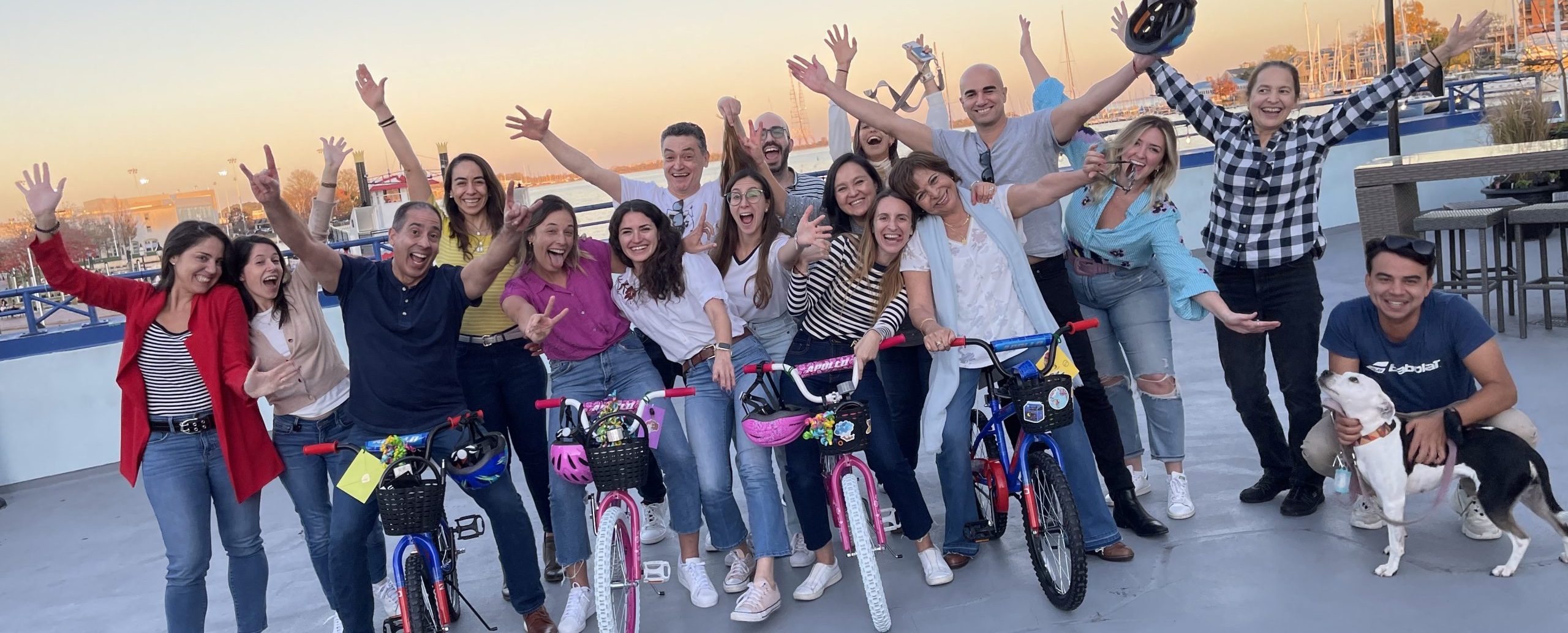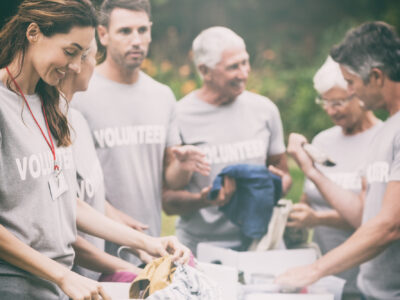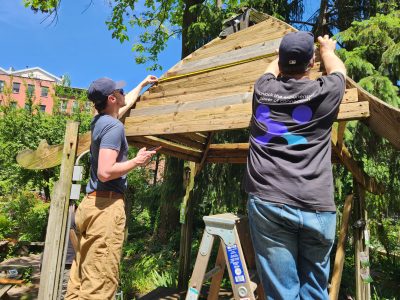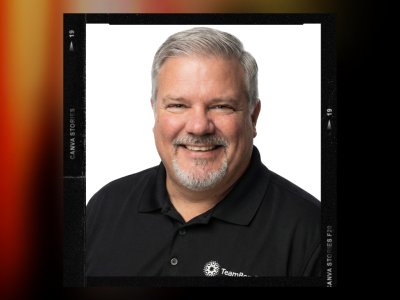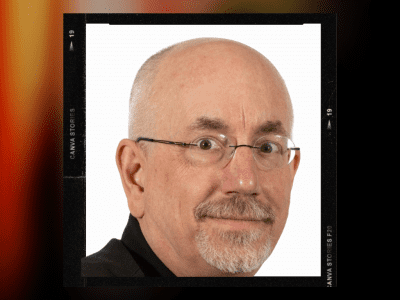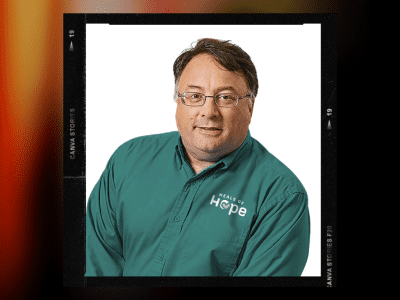STRONG TEAMS DON’T HAPPEN BY CHANCE 
Creating a Culture of Trust: Difficult Conversations at Work
w/ Aden Nepom

Use the buttons above to listen now.
Transcript - Creating a Culture of Trust: Difficult Conversations at Work
Rich, Host: Hello, team! It’s me, your old friend Rich Rinisland, host of Team Building Saves the World, the show where I speak to thought leaders from around the world, discussing variable strategies and tools to help you and your team build a better work environment. And today, we’re going to focus on the idea of psychological safety with TedX keynote speaker, workshop facilitator, fellow podcaster and management trainer, Aden Nepom.
But first I need to share some love with all of my supporters at Team Bonding. If your team is ready to experience teamwork with the power of play, then visit teambonding. com to learn more. Now team, join me in welcoming my guest, fellow performer, improv performer, and host of The Changed Podcast, Aden Nepom.
Aden!
Nobody out there in the audio world can hear, but could have seen that, but Aden just did the loveliest jazz hands.
Aden Nepom, Guest: Hello, my friend. I’m great. How are you? Rich? Thanks for having me on the show.
Rich, Host: Oh, thank you. Thank you for coming on. I love it when I get to work with fellow improv artists and and and facilitators and knowing that I’m not as individualized as I thought I was.
Aden Nepom, Guest: We all like to think that we are unique and special and that is true. But also, we are just like everybody else.
Rich, Host: I am the only one with this beard. That’s all I can say. But Aden, enough about me. I could go on and on. But I want to talk about you because that’s who the audience is here to listen to and to learn all about.
So go ahead and give us that quick background story if you can. Just tell us what it is about you that made you interested in team building, management training, and especially the issue of psychological safety.
Aden Nepom, Guest: Yeah. So, um, I started out in the world of improv many, many, many years ago as a child. And that is not an exaggeration.
I was a child. Um, and I started playing with using improv in facilitation work. And again, this will sound like an exaggeration, but I started in doing that as a teenager. Um, my first experiences facilitating were in a youth group, so peer to peer. And then as part of a program unique to Oregon called Camp Odyssey, uh, which brought together diverse groups from diverse backgrounds to have hard conversations around race and ability and, um, genealogy, you name it.
So, uh, it was like a pretty wild experience to start facilitating before I was 18. And then to think I’ll never do anything with that. And then also to think, and then also to think, man, this improv, things got late, somebody ought to put this on stage as an art form and not just as teaching exercise. Uh, because I grew up in a small town, I didn’t know somebody had already done that.
So I first started by trying to invent improv and as a stage form. And, you know, my. Like many of you, you have a naive perspective of the world as children, and as you grow, you learn more and your reality starts to mirror your ability to know things until you reach middle age, and then you start realizing that you know less than you thought and it’s a weird working backwards.
But, uh, so that’s, that was the beginnings, that’s the roots. And then I spent many years trying to dismiss using improv or facilitation in my career. You know, I got a degree in something completely unrelated. I went, worked in software, you know, I did all the things. Um, and facilitating and improv were sort of like undercurrents all along the way.
So when I was let go from a software company job in 2009, I just sort of, while I was figuring things out, did more. Improv teaching started doing corporate work through the improv school that I at the time worked for. And, uh, my boss and collaborator through those years, uh, it was a wonderful woman who’s still one of my best friends, her name’s Shayna Merlin.
And she runs Merlin works Institute for Improvisation in Austin, Texas. And, she came across Project Aristotle, which was Google search for a high functioning team. And when we talk about psychological safety today, most people that I’ve come to talk with who use that term freely, don’t really know the origins of the term.
And, uh, it was Google’s research, uh, that really brought that term into mainstream. Discussion. So we started talking about Project Aristotle and Google search for a high functioning team and what they discovered, which was it’s not who’s on the team, but it’s how the team functions.
Music: Sure.
Aden Nepom, Guest: And, and that the way to summarize that great team function is that broad term psychological safety, which is largely misunderstood.
And that’s fine. I’m here to clear that up. Um, but so that’s sort of the journey. I, you know, I, I then worked for some other, um, folks and other agency for a long time. And I now have my own company Art of Change, but that’s, that’s the journey I took to get there.
Rich, Host: Plus, you are the host of The Changed podcast.
Aden Nepom, Guest: I am.
Rich, Host: I have to tell you before you came on, um, knowing that you were going to be my guest. I went and listened to you because like anybody comes on who has a podcast, I have to listen to the podcast.
Aden Nepom, Guest: Oh, Rich, thank you.
Rich, Host: Find out what they do. Um, who is your cohost in The Changed Kids podcast? Cause I..
Aden Nepom, Guest: Oh, Oh, we, so that’s my stepdaughter and we, and we had this, she had this brilliant idea because I was podcasting and she wanted to be part of it. And she was like, well, what if we talk to kids? And, um, my aunt Shana Merlin had also the brilliant idea. She was like, you should be talking to kids and Amelia should be your co-host. So, it was like, we had these conversations. So, my first guest on The Changed and only guest on The Changed Podcast Kids is Shayna’s son, Max.
And, um, It was a really fun conversation and I want to do more of that. And so does Amelia. But what we ran into is that kids these days are really over scheduled. And, lining up an interview with a kid is way harder than lining up an interview with an adult.
Rich, Host: And we know how hard that can be.
Aden Nepom, Guest: That can be hard. You know, lining up schedules is hard enough, but, uh, Amelia, has her own schedule. We have limited time at home, which really narrows the possibility. So, it’s basically like these hours on these two days are the only time she can do it. So when we reach out to potential guests and we’re like, Hey, we’d really love to talk to you.
Are you available on any, in any month on this day at this time? And they’re like, oh no, that’s when we have basketball or that’s when we have soccer. So, uh, you that’s why there haven’t been more episodes of The Changed Podcast Kids.
Rich, Host: Please do let Amelia know she has a fan in me. I think,
Aden Nepom, Guest: Oh my God. I love it. I can’t wait to tell her!
Rich, Host: Let’s get back to the business at hand. So you were talking about psychological safety, what, for example, like coming from my era, uh, you know, the Gen-Xers who, who came up as you, you know, this as a performer, you take the job that pays for the career. Um, and as I was working, usually in the corporate world, um, we always thought of, you know, we always heard that term safe space.
Aden Nepom, Guest: Yeah.
Rich, Host: But is that the same as psychological safety or is it different? Or what’s what’s, define psychological space safety for me, please.
Aden Nepom, Guest: Yeah, I don’t know that safe space means the same thing now that it did when you and I started using that term. I mean, I, it used to be in my bio, Aden creates safe spaces for people and now, and now I’m like, safety is an illusion.
Rich, Host: Okay..
Aden Nepom, Guest: Yeah, reliability reasons. I cannot guarantee that this will be a space in which you are safe in every conceivable way. But what I can do is create a space where you are, where you feel safe.
Rich, Host: Okay.
Aden Nepom, Guest: You know, right. If we feel safe to speak up. So psychological safety is basically the sense that you are in an environment where your opinions are valued. That means that you can speak up when things aren’t working or going well. You can have hard conversations, give direct feedback, uh, poke holes and ideas.
And at the same time, bring your ideas to the table. Know that people will take those ideas seriously. And those things may sound like they’re different, but they’re not. Um, you want to be able to poke holes in each other’s ideas. This is actually the nature of the scientific process, right? People reach consensus by coming up with a workable idea that they then test that people then challenge and try and reproduce and or poke holes in, in order to reach a place of consensus until someone thinks of something better.
So, so that’s it. That’s psychological safety in a nutshell.
Rich, Host: Plus that safe space has to, can’t just be for me. It has to be for you as well.
Aden Nepom, Guest: Right. It’s the, it’s the sense on the team. So we’ll take it into the work environment and say team. It’s the sense on the team that at, in this team, we value speaking up.
Rich, Host: Okay. So now what are some of the misconceptions you’ve seen?
Aden Nepom, Guest: Okay. So I’ve seen some really fun ones, but I mean, people have left jobs because of them. Uh, Because that’s the consequence of misunderstanding these types of ideas is if you promote safety, for example, is a false promise that this is a place where you are safe, meaning like you will feel like a baby being held.
In your mama’s arms and be rocked gently to sleep at your desk where you will produce great results by some mystery. And that’s, that’s not psychological safety. I don’t really know what to call that other. I could call it from a, like, I hate saying this. I’m going to say it. And then I’m going to later be like, cut this out.
But it feels like coddling, you know, it’s, I think people want to be unconsciously want to be coddled. In order to feel safe. And there’s nothing inherently wrong with that. Wanting that we all want to be held. We all want to be hugged. We all want to be validated. Um, whether that’s physically or emotionally, but that’s not quite the same as being in an environment where we value challenge.
Rich, Host: Right.
Aden Nepom, Guest: Um, the other one, and this one’s more recent. I had a friend of mine, uh, whose boss held a meeting. With all the key stakeholders into the organization and was like. I brought us here together today because we do not have a psychologically safe environment in which we work.
Everyone in that room was confused because they all challenge each other, work great together, collaborate all the time and have these great outcomes. And that boss was like, so checked out as to what was happening on the inner workings of the organization, that the statement, first of all, put everybody in this place of, you know, what are you talking about?
And then he followed that up with and we’ll know we’re in it when I can say what I need to say to you and you’re fine.
Rich, Host: Oh man.
Aden Nepom, Guest: Right. So what that says is
Rich, Host: First question that comes up is, where have you been working?
Aden Nepom, Guest: Yeah, right. Well, what he wanted to say to people, he wanted to say things that were harsh without reason, right? So, he wasn’t putting things into terms of, um, you know, thank you for bringing up that idea. Have you considered this, you know, right. Which would be a psychologically safe way to, it’ll be like, you know, hey, your idea is valid. And also, it seems like you’re not thinking about this detail instead. He wanted to be like, you suck. You’re a blowhard. You’re lazy. You know, Hey, everybody’s psychologically safe with that.
Rich, Host: I know that boss. Totally.
Aden Nepom, Guest: And I think I’m exaggerating a little bit. I’m sure he used more formal language, to say, you suck, you’re a blowhard, you’re lazy. So, uh, and the person who shared that story with me left that company. They’re no longer there. They, in fact, they gave notice, uh, within 20 minutes of that meeting, uh, because the writing was on the wall for where the company was headed.
Rich, Host: You’re speaking with your company, The Art of Change, cause I saw, I love the catchphrase “Change is Coming. You’re a part of it.” What is the change..
Aden Nepom, Guest: Change is inevitable,
Rich, Host: Right? Sorry. Yes. Yes.
Aden Nepom, Guest: Yeah. Change is inevitable.
Rich, Host: So how can you promise that? First of all, what do you mean by, by change when you talk about it?
Aden Nepom, Guest: So, change happens all the time.
And this was what sparked me to want to do The Changed podcast in the first place. It’s just, we use this word change so frequently and almost meaninglessly. As often as we use it, let more often than we use it in a way that’s meaningful, um, because we change our clothes, we change our socks, you know, we, we also change our careers, we change our strategic approach to the fiscal year, so we change all the time.
And what The Art of Change seeks to do is equip people with the skills and the tools to communicate through those changes, um, in a way that we can be more purposeful about change. You can be at the helm of change, or you can be, uh, cast, you know, from wave to wave, uh, in a, in a ship that’s got holes in it.
It just depends on how you approach things.
Rich, Host: But how do you guarantee psychological safety in that world? Um,
Aden Nepom, Guest: I don’t guarantee psychological safety.
Rich, Host: Yes. You had actually said at the beginning, you can’t guarantee that.
Aden Nepom, Guest: I think, yeah, I think that would be a false promise, but what I do give people are the tools that build psychological safety.
You know, I’ve been, I’ve been in the team building and communication skills business for, um, a long number of years. I don’t really want, I think I look younger than I am. And so I don’t want people to really know how long I’ve been doing this. But, um, It’s a really long time. And, uh, you know, it’s, I mean, I should say, but I’m not going to say I’ve probably said on another podcast, um, but I’m also Gen X, so I’ll just give you,
Rich, Host: Okay.
Aden Nepom, Guest: Yeah.
Rich, Host: That was a huge number of years. So, I wouldn’t even worry about it.
Aden Nepom, Guest: Massive amount of years. So, all of that is to say that I’ve seen teams, uh, work together through, even just a team building experience, and come out of that with a new understanding of each other. And I’ve also seen people go through a facilitated conversation, uh, around something that would have been really hard to talk about, but they come through with really clear objectives and the experience of having spoken in an honest and transparent way, uh, towards the facts and the details and the things that matter to everybody, even when the opinion’s different and come to consensus.
When that happens, teams experience the psychological safety that they can then they now have a frame of reference for how to move forward as opposed to what often people in our culture default to. And actually, I was just listening to a podcast about this yesterday or the day before. I wish I could remember the name of it.
So I could. cite it. Um, they were talking about the problem with niceness in the workplace, right? And trying to create safe spaces, people will often, um, couch their feedback with niceness. And then, and then you miss the important thing or they won’t say it at all. So that thing where, you know, which violates trust, right?
It, I’m talking to you for an hour and a half and you don’t tell me I have spinach in my teeth. Then I know I can’t rely on you to tell me what’s what. And, and people don’t speak up on things like that because they’re afraid of how they’ll be perceived as not being nice or making you feel awkward in the moment.
Rich, Host: So, the change is going to come, as you say, it’s inevitable.
Aden Nepom, Guest: It’s inevitable changes on the way,
Rich, Host: Even the change, uh, within the idea of psychological safety. I mean, there are different methodologies that can be used to get to get people in that mode. While psychological safety is going to change the methodologies behind it, the overall importance of it shouldn’t.
Is that correct?
Aden Nepom, Guest: Oh, sure. Yeah. The importance of psychological safety and high functioning team. It seems unlikely that will reach it’s possible but it seems unlikely that will reach a place where you know management studies and the experts say, absolutely not. We do not want people to bring ideas to the table or to point out flaws.
I think that that it’s highly unlikely because what we know when we don’t have those things are hospital wards with really high mortality rates. We know we’ll have companies that go under for lack of creative ideation. So, you need to have that psychological safety. Now the methodologies to get there really could change.
Rich, Host: Yeah
Aden Nepom, Guest: They really could. Right. So, you know, I’ve I’ve As a person in the improv world as a person who’s been coming in and doing improv team building. It already has changed it will continue to change. I mean you remember I’m sure rich used to go in to an organization and if you asked anybody, if they’d heard of improv.You get a few hands and then you’d ask them to clarify and they’d be like, Oh, it’s that comedy club with the brick background and they have that TV show live at the improv.
Rich, Host: Yeah. Yeah.
Aden Nepom, Guest: And now if you ask audiences, if they are familiar with improv, there’s a significant number of people in that audience who will have taken improv classes.
Right. So We, we know that even just in that one methodology of using improv as a team building exercise that the game has changed. We’re no longer introducing a brand-new idea. In some ways we are simply showing up as a, as a, an expert in that area for having, you know, experience in it. But it’s one perspective of many.
Rich, Host: And I want to get into it a little more deeply as we come back, because I hope you don’t mind. I need to step away just for a brief second, because I need to tell everybody out there about a company I am very proud to be a part of, TeamBonding. TeamBonding was founded over 20 years ago with one simple question.
How can employees have a great time while fostering strong, authentic bonds between people who work together? No matter where your company is located, TeamBonding offers powerful, engaging, custom team building events designed to get the best out of your team anywhere in the world. They’ve created a catalog of innovative events using the power of play as a learning tool and tapping into the correlation of work and play.
So whether it’s scavenger hunts to Jeopardy or so many more, the team bonding of activities, whether it’s live, virtual, or hybrid, maximizes the impact of team building with an accent on fun. Visit TeamBonding.com to schedule your event now. TeamBonding, when you want seriously fun results. And speaking of seriously fun, I’m so happy to be here with my guest Aden Nepom.
We are talking about keeping psychological safety and also the power of change. Aden, I gotta talk to you. We were starting to talk about improv. How do you use improv to actually promote the idea of psychological safety?
Aden Nepom, Guest: Well, there’s two ways. So one of the ways that improv is really helpful is in creating. So, when people have fun together, and I think, you know, this rich, when people have fun together, it builds bonds. And when people feel bonded, um, and feel close to each other, they feel more inclined to share with each other. So that one way that improv is helpful is in opening up those relationships and building those bonds.
Um, but I also use improv in other ways,
Rich, Host: Such as
Aden Nepom, Guest: Activate learning different communication habits. So, I use my experience as an improv teacher. Uh, what I don’t do, I feel like I need to say this. I don’t bring people up on stage to do role plays unless that’s specifically requested simply because I’m not personally a fan of the ambush approach to helping people open up. Um, I think that people open up in their own timing. But what I do have people do is have conversations with each other in the room. And, uh, but simultaneously. So it’s not like an audience is watching.
Rich, Host: That’s exactly what I was going to say. If you’re bringing like a group of three up out of an entire room. You’re creating an audience, not a team.
Aden Nepom, Guest: Exactly, so I want people to have conversations in the room and I want them to build new habits with each other so that they can leave the room ready to continue communicating to each other and with each other in the ways that build, that I believe build that psychological safety.
So, I use the experience as an improv teacher to teach these habits and give exercises that bring those to life in the same way that I would teach. In an improv class where you’re going to have an experience, we’re going to talk about how it went in general and what we think it might take to make that a more powerful or more useful or more practical experience, and then we usually will do another round of that.
Um, the other thing that I do, which is not specific to improv is I bring communication tools to the table that come from. My dad’s brain. My dad was a best-selling author in this space. And so, I have all of the tools he developed and I get to use Improv. I guess it is Improv related. I use Improv to bring them to life, which is really nice.
Um, yeah, in fact, my dad, Dr. Rick Kirshner, he co-authored “Dealing with People You Can’t Stand”, uh, they just put out a new edition of that book, uh, at the beginning of last month. So there’s new chapters in there that I got to contribute ideas to, which felt really great. Um, but yeah, so that’s, that’s a little bit of how I do that.
Uh, right now, the place where I think I am having the biggest impact is helping people have difficult conversations, have the most challenging communications.
Rich, Host: Yeah, I was going to ask, like, can you give me an example of that? Like, what is it that you do? Some of the strategies you would recommend. I don’t want you to give away the store here. I still want them. I want enough for someone to go, hey, we could use that and call you, but not go, hey, thanks for giving me the whole recipe. I’m going to do it on my own now.
Aden Nepom, Guest: Actually, it’s a really simple recipe and you can see the recipe on my sub stack. I am giving away the recipe for free. I tell workshops for free.
Um, what you don’t get by hearing the recipe is the same as experiencing the recipe in the room, right? You don’t get to cook the ingredients and walk out having practice and confidence in them. Um, but there are five pillars to a reasoned exchange from my point of view. And. I was just thinking about this this morning.
I was, I was just thinking that the first pillar is so important that it should just be It’s just its own thing. It’s so important. And it’s the step everyone wants to skip.
Rich, Host: Oh, okay. What’s that?
Aden Nepom, Guest: The step that’s so important that everyone wants to skip is knowing why you’re having the conversation in the first place.
You have to have a really clear objective for having a conversation with someone when you disagree, when you’d already know that you disagree. Right. You aren’t super crystal clear on what the purpose is for having a conversation. Then you’re never, you’re just going to escalate or cause a rift or best-case scenario, spin your wheels.
So, you need to know that crystal clear objective and the way that you can tell it’s crystal clear and that it’s a good objective is that you can say it out loud to the person that you’re communicating with.
Rich, Host: Ah, okay.
Aden Nepom, Guest: So, for example, if we are having a political dispute and I come to you and I say, I want you to listen to me because I’m right, and you’re wrong, which is a lot of people’s hidden objective..
Rich, Host: Yeah, that’s where we are right now. Yeah,
Aden Nepom, Guest: Yeah, that’s not going to work. You’re not going to get the outcome that you want, because think of somebody came to you and said the same thing. I’m, I want you to listen to me because I think you’re wrong and I think I’m right. And I want you to admit it.
Everyone immediately gets their backup, right? Uh, so, you know, I like to tell this story when I, when I train, um, about this, uh, I came out I don’t have you ever been Austin, Texas?
Rich, Host: Yes, actually. I love it there. Yeah.
Aden Nepom, Guest: Did you ever go to Kirby Lane cafe?
Rich, Host: I have actually. Yeah. Okay.
Aden Nepom, Guest: So this just just to paint a picture, I step out of Kirby Lane cafe, full with brunch.
And there’s this like, Red hot rod car parked in front of Kirby Lane. And there’s two men standing one on each side of the, like they’re standing by the doors, but they’re standing outside the car. Their faces are red. I can’t hear them yet, but their faces are red. They look like one of them is going to fly across the car and punch the other one in the mouth.
Like, I don’t know what they’re arguing about, but as I get closer, cause I have to, to get to my car, I hear one of them looked at the other one. He throws his hands up in the air and he goes. What are we fighting for? We could be eating pie.
And the other guy just. He throws his hands up in the air. They both open those car doors, they get in and they drive away. So I, I don’t know what they were fighting about,
Rich, Host: That pie is the great equalizer? but I think the moral story is
Aden Nepom, Guest: But I think the moral story is really clear, right? If you don’t know what you’re fighting for, you could be eating pie. You can be doing any number of things.
That’s better than just continuing to do this, this, this. So, you want to have that really clear objective. Otherwise, it’s a waste of everybody’s time, energy, and emotional health to stay in it.
Rich, Host: And how many times have you seen that people were thought they were arguing about the same thing, but we’re actually arguing completely different points?
Aden Nepom, Guest: Well, yeah, of course that happens all the time. People also, um, you know, we work on listening activities when I, when I train with folks, because one of the things people do out of a sense of helpfulness is they try and solve a problem before they know what the problem is. Uh, it’s another very helpful thing people do like, oh, I know, I know what you’re talking about, here’s what you need. And that’s not the thing the person needs. And if there had been any questions asked, they would know they’d already tried something. So yeah, it listening is really, really important, but first and foremost, you should absolutely know. What your objective is. And I’ll give you an example of a good objective, um, and work objectives sometimes are super easy.
Just say the work objective,
Rich, Host: Right?
Aden Nepom, Guest: Right. You know, it’s a lot easier than politics. I’ll tell you this, right? If I really think that, you know, the sneaker should be red and you really think the sneaker should be blue, but we have a design deadline that says we have to pick a color, you know, then I can state that as an objective.
Hey, we have a design deadline and I want us to walk out with a decision by the end of this conversation. That’s a really clear objective.
Rich, Host: Yeah.
Aden Nepom, Guest: Super easy. Um, so, but I think people want to skip it and they want to skip to why they’re right, or the talking part. They want to skip the, so, you know, that’s, that’s, Pillar number one is really important.
Rich, Host: Nice. I have to actually admit, um, one of my failings that I only discovered since my divorce, uh, because my ex-wife and I are…
Aden Nepom, Guest: this is very enlightening.
Rich, Host: Yeah, but once it happened, you know, we’re still raising our daughter together. Um, and since the pandemic, we decided to even share the old house, together to make sure that everybody was safe.
We’re all in the same place, but financially it just made it, you know, much more viable situation. At one point, and I did not know I did this until she pointed it out, I’m a sentence finisher. So, she would start saying something and I would throw out what I’m certain the end of the sentence was going to be and she looked at me and she went, no, that’s not what I was going to say.
You have done this since I met you. Done what? And she goes, assume you know where I’m going. You don’t always. And just hearing that I went, Oh, wait a minute, I’ve been doing that with everybody forever,
Aden Nepom, Guest: Amazing.
Rich, Host: Yeah, but being able to hear it and the fact that we were trapped in the house together while the pandemic was raging outside our doors, I had to listen. I had to pay attention.
Aden Nepom, Guest: Wow. What a great, clear, direct piece of feedback.
Rich, Host: Yep. Yep. It made living together a lot easier. Let me tell you. And there are still times where I find myself doing it, and I have to apologize.
Aden Nepom, Guest: We all, we all fall into communication habits.
Rich, Host: Mm hmm.
Aden Nepom, Guest: For one reason or another, they’ve served us in some way, whether we realized it or not, but knowing, and this is true about all of our habits,
Aden Nepom, Guest: Knowing what we’ve done is what we’ve done is the first step in knowing what we can do differently.
Rich, Host: Nice. Yeah, that’s a great saying. Um, and speaking of which I noticed that one of the tools that you like to use are mantras.
Aden Nepom, Guest: I do like mantras. I picked up, I picked up mantras actually when I was working for On Your Feet, which is an improv-based consultancy here in Portland, Oregon.
Rich, Host: Okay.
Aden Nepom, Guest: And I do, I really like using mantras, is something I was doing unconsciously. And it became part of my conscious choice. And I think it’s really transformative. It’s so simple.
Rich, Host: Can you give me some examples of, uh, some of the mantras that you use, especially concerning psychological safety?
Aden Nepom, Guest: Sure. Um, yeah, yeah. So just to give everyone a sense of this. So, if you’ve done any meditation, you know what a mantra is something that you repeat over and over again, helps ground you.
Um, however, what the idea of choosing a mantra is all about is that we pick mantras unconsciously all the time. I’ll give you a non-work related example. Um, I was training with a colleague and the group was having discussion and he looked at me and he goes, I just looked at traffic. It’s going to suck when we get out of here.
It’s going to suck. And I was like, Oh, what’s your mantra right now? Because it’s going to suck is a mantra.
Rich, Host: Yes.
Aden Nepom, Guest: So, one of the things that’s true about, um, improvisers who get on stage and make up stuff together, uh, without enough information or resources or practice or a script or polish or any of it, improvisers, Naturally have helpful mantras when we walk out on the stage that allow us to set the day aside and get really present.
Um, and one of my favorites for that setting, uh, has always been both unconsciously and consciously. I don’t know what’s going to happen, but it could be great.
Rich, Host: Yep. Good. Nice one.
Aden Nepom, Guest: Yeah, it’s a really simple one. It could be great is useful because it opens up that possibility. So if we’re trying to build psychological safety, uh, and my second pillar of reasoned exchange, which is making useful assumptions, this is a great place to do that is to think about what’s your mantra.
When you’re interacting with the other people on your team, if your mantra is, Oh, here comes Bill again, are you creating an environment of psychological safety where people are welcome to share their ideas and poke holes in your ideas?
Rich, Host: Yeah,
Aden Nepom, Guest: Probably not. So, if you change your mantra only slightly to, well, here comes Bill, I wonder what he has to say. There’s a tone. There’s a tonal difference that..
Rich, Host: Yes! Yeah.
Aden Nepom, Guest: Words are part of it. The tone matters, but that’s just a quick example. I’m sure you could come up with one yourself.
Rich, Host: Well, it’s sort of like, it’s sort of like the psychological benefit of just smiling.
Aden Nepom, Guest: Sure.
Rich, Host: When you don’t smile.
Your body and your brain and your mind go into a specific area, but just forcing those muscles to work in that particular conjunction lifts your spirit and gets your mind focused more in a positive, upbeat method.
Aden Nepom, Guest: Sure. Yeah, it is. It’s a similar principle. Yeah, I, you know, another one, I think for leaders, um, I want to be a resource today is a nice way to think about how are you setting your team up for success?
How are you making yourself available to them rather than a top down approach?
Rich, Host: Excellent. Yeah. I Aden, here’s the problem. I could go on and on talking about this, but this show has a time limit. We have so many different possibilities of just ways we can take this conversation. Yeah. Um, and said, I want to try to wrap up if I can give me a piece of actionable advice that someone out there who’s listening right now can implement either within themselves or within their own team. To get this focus on psychological safety as a part of their every day.
Aden Nepom, Guest: I’m a big believer in leading by example. I, I think we’ve spent a lot of time waiting for other people to create an environment of psychological safety for us, waiting for other people to make our ideas heard or waiting for other people to ask for our feedback.
And so I think the biggest takeaway that I would love people to walk out with is the only behavior you can control is your own. And that’s not a shock to hear. You’ve heard it many times. You already know. And yet
Rich, Host: I’ve said it millions of times
Aden Nepom, Guest: And yet, right. So really starting to practice, investigate your own assumptions, getting really clear on why you’re having conversations.
And when you give feedback, thinking about how do you give simple, practical, detailed. Feedback as opposed to personal opinionated feedback. Uh, those, those things will be huge.
Rich, Host: Love it. Love it. My team out there. Please give that big round of applause one more time for Aden Nepom. They love you. There’s actually a thousand people I keep trapped under my desk.
Aden Nepom, Guest: You know, trapped, housed, it’s all, um,
Rich, Host: I hear they’re unionizing. So I, I want to watch out. Yeah. I want to support that with them though. I think, I think that, uh, you know, it could be helpful. Did you have a good time today?
Aden Nepom, Guest: I did. Thank you so much, Rich. This is a wonderful conversation.
Rich, Host: Thank you for coming on board and I hope you continue to have a good time because it’s time for my speed round.
Aden Nepom, Guest: Okay, let’s do it.
Rich, Host: I want to play some radio.
So just one more time to explain this to you. I know I explained it to you in the before the show, but I want to get this out again. Um, just, you know, it’s going to be 60 seconds where I’m going to ask you a variety of just complete innocuous questions. It’s a nice chance for the audience out there for my team to get to know you a little bit better.
As this is a game, and if you are feeling up to the task, we have had a maximum of 15 questions asked and answered in 60 seconds.
Aden Nepom, Guest: That’s a lot. Let’s see.
Rich, Host: Let’s see if we can. It’s okay. Don’t worry about it. Nothing happens bad if you don’t. Okay. I’m going to play some music. I’m going to ask the first question.
Aden, if you’re ready, let’s go.
Aden Nepom, Guest: Let’s go.
Rich, Host: What’s your name?
Aden Nepom, Guest: Aden.
Rich, Host: How many kids do you have?
Aden Nepom, Guest: One.
Rich, Host: How many pets?
Aden Nepom, Guest: One.
Rich, Host: If you could ask your pet a question and actually get an answer, what would it be?
Aden Nepom, Guest: How are you doing, actually?
Rich, Host: If you could live in any TV home you desire, which one would it be?
Aden Nepom, Guest: Oh, boy. Probably Probably the house in Family Ties, that family.
Rich, Host: Yeah. What’s your favorite ice cream?
Aden Nepom, Guest: Ice cream.
Rich, Host: Would you rather live for a week in the past or the future?
Aden Nepom, Guest: Say again.
Rich, Host: Would you rather live for a week in the past or the future?
Aden Nepom, Guest: Future.
Rich, Host: Uh, what’s your most embarrassing childhood memory?
Aden Nepom, Guest: I’m getting a spider bite right here that made it look like I had a black eye. And then going. Welcome to the bar mitzvah of my biggest crush.
Rich, Host What’s your favorite childhood memory? Um,
Aden Nepom, Guest: sitting on the tailgate of the pickup truck with my dad, eating a Haagen Dazs ice cream outside of Lithia Park.
Rich, Host: That’s beautiful. You got 11! Oh man! That’s really not bad.
Rich, Host: Aden, quick, before we say our farewells for today, and again, I want to thank you so much for coming on and being with us. This was a fantastic conversation. But can you tell my team out there how they can find out more about you and where they can find you if they need to reach out to you?
Aden Nepom, Guest: Yeah. You know what?
Connect with me on social. I’m on all the platforms, but I’m the most active on LinkedIn. So send me a message. Let’s talk. If you have questions, if you have any questions about anything we talked about here today, that’s the fastest way to get answers. Just connect with me on social. And I’m sure, obviously there’ll be links to my website and stuff in the show notes.
So, I wouldn’t worry about any of that, but just find me on LinkedIn. Let’s talk.
Rich, Host: And don’t forget to go listen to The Changed podcast and The Changed podcast, Kids. It’s a fantastic little podcast. I really do enjoy it myself. Thank you
Aden Nepom, Guest: Thank you. And
Rich, Host: my team out there. That’s it. We’re wrapping up yet another episode of Team Building Saves the World.
If you’ve enjoyed this episode, whether you’re new to the podcast, an old fan of the show, please be sure to share it with everyone that you know, whether they’re a coworker, a friend, a family member, just helps us to share all this vital information. You can find out all about us, including all past episodes at TeamBonding.com/podcast. You can also find us wherever you find your favorite podcasts, Google podcasts, Apple podcasts, Spotify, wherever you go to listen, my friends, we will be there. And please don’t. Don’t forget to look for us on all the social medias while you’re looking for Aiden. You can find us at Team Bond Podcast.
And leave us a message. Tell me what you liked about this show. Tell me what you didn’t like about this show. Tell me what you’d love to hear about in a future episode. I do want to hear from you. So, before we say our farewells for this episode of Team Building Saves the World, please never forget my friends, if you are within the sound of my voice, you’re on my team now.
And I am forever going to be on yours. So long, team. See you next time.
August 19, 2024
In this episode of Team Building Saves the World, social dynamics expert Aden Nepom joins host Rich for a chat about having difficult conversations at work. Aden explains the basis of psychology safety – the concept that refers to creating a work environment where employees feel safe to take risks and share their opinions without punishment or embarrassment – and its effect on employee wellbeing. The pair also discusses how team building activities can foster an inclusive workplace where employees feel more inclined to share things with each other and have hard conversations at work. Listen in to create a more open, honest, and tightknit workplace culture!
About Aden Nepom:
 Aden Nepom is a TEDx and keynote speaker, workshop facilitator, podcast host, and award-winning performer who has taught thousands of executives, industry leaders, and individuals the simple yet powerful steps to communicate effectively. Aden’s engaging and interactive approach has been praised by clients for her unique ability not just to connect with the audience but to foster an atmosphere of trust and openness that helps them connect with each other. She combines powerful communication tools with a background in improvisational theatre to bring new communication skills and tactics to life for professionals who care about the work they do and want to make a positive impact in the world. People leave Aden’s talks and workshops able and eager to implement what they’ve learned, enjoying stronger influence, more creative problem solving, and deeper relationships with their colleagues.
Aden Nepom is a TEDx and keynote speaker, workshop facilitator, podcast host, and award-winning performer who has taught thousands of executives, industry leaders, and individuals the simple yet powerful steps to communicate effectively. Aden’s engaging and interactive approach has been praised by clients for her unique ability not just to connect with the audience but to foster an atmosphere of trust and openness that helps them connect with each other. She combines powerful communication tools with a background in improvisational theatre to bring new communication skills and tactics to life for professionals who care about the work they do and want to make a positive impact in the world. People leave Aden’s talks and workshops able and eager to implement what they’ve learned, enjoying stronger influence, more creative problem solving, and deeper relationships with their colleagues.
The step that's so important that everyone wants to skip is knowing why you're having the conversation in the first place. You have to have a really clear objective for having a conversation with someone when you disagree, when you already know that you disagree. If you aren't super crystal clear on what the purpose is for having a conversation. then you're just going to escalate or cause a rift or best-case scenario, spin your wheels.
Aden Nepom
More great podcast episodes.
Season 6 | Episode 18
That’s a Wrap!
Season 6 | Episode 17
Work-Life Integration
Season 6 | Episode 16
Laughing it Off
Season 6 | Episode 15
Corporate Volunteerism in Action
Season 6 | Episode 14
Collaborative Play at Work
Season 6 | Episode 13
The Science of Supportive Workplaces
Season 6 | Episode 12
The Power of Being Present
Season 6 | Episode 11
The Age Advantage
